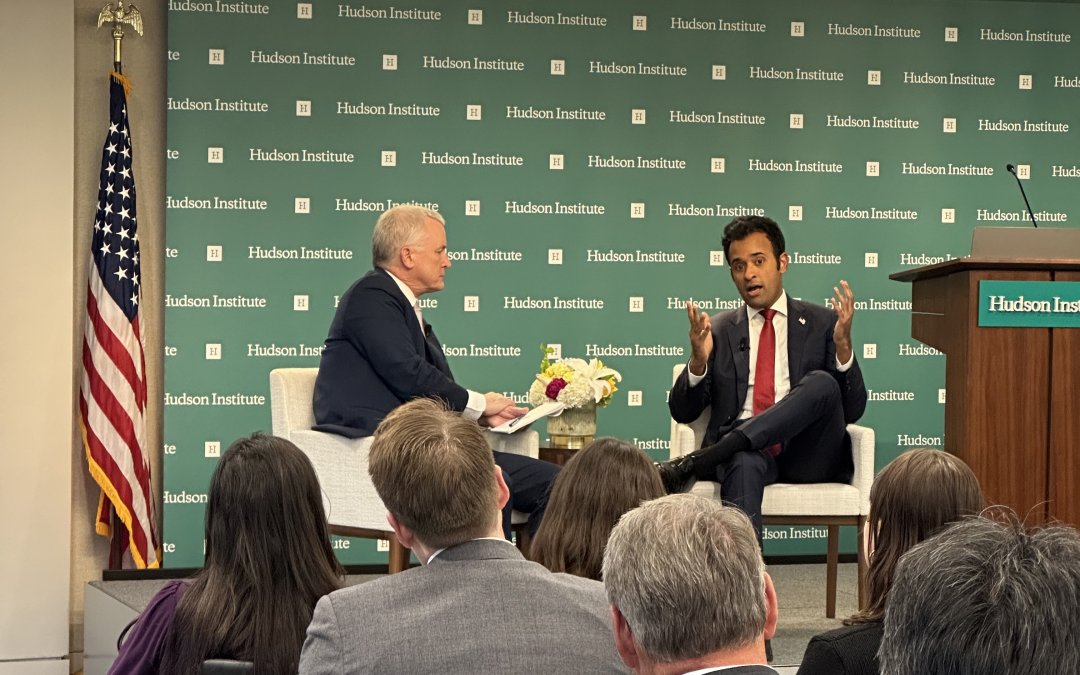WASHINGTON – Republican presidential candidate Vivek Ramaswamy stressed that further involvement in Israel and Ukraine would render the U.S. vulnerable to China’s emerging power during a speaking event at the Hudson Institute on Tuesday.
“I worry that the Russia-China alliance is the single greatest threat to the future existence of the United States of America,” Ramaswamy said.
The political newcomer described his three foreign policy goals as avoiding a third world war, establishing economic freedom from China and expanding the U.S.’s homeland security safeguards, including stricter policies on the southern border and strengthening nuclear and space-based defenses.
Arguing that his foreign policy adopts an “America first” outlook, the candidate stood resolute in his stance on U.S. involvement in Ukraine.
“I do not believe that this war advances American interests,” he said. “I worry that our continued engagement militarily in Ukraine is driving Russia further into China’s hands by the day, strengthening that Russia-China military alliance.”
The 38-year-old said that Ukraine’s Donbas region, which is currently occupied by Russia, comprises a majority of citizens who do not want to affiliate with Ukraine and that the U.S. should acknowledge Russian president Vladimir Putin’s authority over that land. The Washington Post reported last year that opinions largely vary across Ukrainian-controlled and separatist-held areas.
Ramaswamy said that he is also in favor of blocking any attempts of Ukraine to join the North Atlantic Treaty Organization, or NATO, and in exchange demand Putin to end Russia’s military alliance with China.
When asked what incentive such a deal would have for Russia, Ramaswamy said, “I don’t believe Putin enjoys being Xi Jinping’s little brother.”
“Putin will still send weapons to India and to Vietnam, showing us that there are kinks in that armor,” he said. “This is our moment to exploit the kinks in that armor to actually pull apart the two allies, Russia and China.”
Amidst Congress’ impending consideration of a joint Ukraine-Israel aid package, the aspiring Republican nominee said the country should not “conflate” Israel with Ukraine, “where there are very different issues at stake.”
“It was wrong. It was barbaric. It was medieval. It was immoral, and Israel absolutely has the full right to defend itself and its right to existence,” Ramaswamy said about Hamas’ attacks earlier this month.
However, Ramaswamy decried support for Biden’s $106 billion aid request for Israel and Ukraine, citing concerns about U.S. involvement. He cautioned against continued long-term military aid to Israel, saying that the U.S. would be better off disengaging from the Middle East.
“Is Israel even likely to succeed in that ground invasion?” Ramaswamy said. He cited concerns about an Iranian counter-offensive in the region, particularly from Iran-backed militia groups, as well as a future terrorist presence in the region.
“Just as ISIS succeeded Al-Qaeda, what succeeds Hamas 1.0 might be a worse version if history teaches us what might happen here all over again,” he said. Ramaswamy has been critical of the fallout from prior U.S. involvement in Afghanistan and Iraq, pointing to the Taliban’s continued presence in Afghanistan and anti-American sentiments in Iraq.
Ramaswamy further added that while he supports continued diplomatic and intelligence support to Israel, he was wary of U.S. military involvement in the region.
The former biotech entrepreneur has branded himself as an outsider in the GOP candidate field, and his Republican opponents have called his foreign policy stances ill-informed. He has also previously said that the U.S. withdrawing from NATO and reassessing its membership in the United Nations were both moves to consider.
Competitor and former United Nations ambassador Nikki Haley has frequently admonished Ramaswamy, saying at the Milwaukee debate in August, “You have no foreign policy experience and it shows.” The Democratic National Committee said in a statement following the Milwaukee debate, “he is siding with Vladimir Putin and against our allies.”
The Republican hopeful participated in the Hudson Institute’s Presidential Speech Series on Tuesday. After his speech, Ramaswamy took part in a moderated discussion with Hudson Institute Senior Fellow and director of the Center for Peace and Security in the Middle East Michael Doran.
Ramaswamy is one of four candidates who qualified for the third GOP debate scheduled for Nov. 8, alongside Ron DeSantis, Nikki Haley and Chris Christie, according to their campaigns. Former president Donald Trump has not indicated that he will be participating in the Miami debate.


